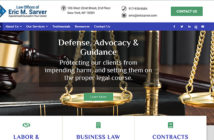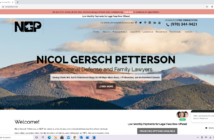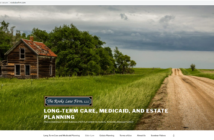Demonstrating expertise, opening doors, and generating referrals with monthly podcasts.
Gordon Firemark is an entertainment and new media attorney located in California. He represents artists, writers, producers, and directors in theatre, film, and TV. He also hosts two podcasts, one called Entertainment Law Update and one called Entertainment Industry Insights. He is working on an e-course designed to teach other lawyers the ins and outs of podcasting.

Entertainment Law Update is a monthly podcast Mr. Firemark hosts with a co-host. The audience is anyone interested in the latest legal news affecting the entertainment industry.
Entertainment Industry Insights features interviews with top entertainment industry professionals.
Mr. Firemark discusses his passion for podcasting and how he uses it to generate new leads for his entertainment law practice. He records his own podcasts and says it is easy enough that anyone can do it. All you need is a microphone, a computer, and audio editing software.
1. Have you used podcasting as a lead generation mechanism or to acquire new clients for your law practice?
I do, but its primary purpose is positioning. The podcast makes it clear to the world that I’m an expert in the field of entertainment law.
My primary audience consists of lawyers, law students, and professionals interested in legal news topics related to the entertainment industry. The leads I generate tend to be referral sources. I don’t think many client prospects seek out podcasts for entertainment lawyers, but when they find me they see I have a podcast and YouTube videos on my website, so they take an interest in those and find out that I know my stuff.
I am creating a course right now where I teach other lawyers how to do podcasts. It will have standalone presence. The umbrella page will be www.lawmarketingmedia.com. It’s a blog I set up. I’m creating the course content as we speak. It will be an e-learning course and will go live in the next month. It’s called “Power Podcasting for Lawyers.”
2. Can you trace those leads directly to your podcasts or do your clients come to you through a variety of means including your podcasts?
I always ask new leads or new clients, “How did you hear about me?” Most of the time, they answer, “So-and-so referred me.” If it isn’t someone I know personally, then I assume it was someone who saw my website or heard my podcast.
A part of it is good for Google positioning. I target a particular keyword for the subject matter of the show and because I have several podcasts and YouTube videos that rank in the search engines, my overall rank is higher. I post a new video and a new podcast every month, so I’m always creating new content.
3. Do you have a specific strategy for your podcasts or do you simply get an idea for a topic and start talking?
The podcasts are a one-hour round up of legal news stories affecting the entertainment and media industry. It’s targeted toward other lawyers and entertainment professionals. I’m challenging the prevailing notion that to do an effective podcast you have to publish it more often than once a month. Who has time to prepare a show every week when you are trying to practice law? So I publish a new podcast once a month.
I have a co-host. We and our interns meet once a week for a production meeting. We’ll flag stories we think are interesting and discuss those in the production meeting. Then we decide which ones we’ll discuss.
After the meeting, we’ll send out our interns, they’re law school students, and have them write summaries of the stories. Then the co-host and I get together and talk about them.
Basically, we’re outsourcing our scripting to law students.
We’re fortunate to have a sexy subject, so it’s a topic that lawyers in other fields might be interested in too. So our audience is a little broader than just entertainment professionals. It’s a topic that potentially anyone can be interested in because we talk about copyrights, financing creative projects, and so on.
4. Where do you publish your podcasts?
The podcast’s website is http://www.entertainmentlawupdate.com/ and I cross-post episodes to my law firm website at http://firemark.com/. The podcasts are produced in-house.
I come from a radio and production background. That’s what I did before I went into law, so I can do that. But it’s easy enough that anyone can do it. It’s not complicated.
5. What kind of equipment do you use?
I have a Macintosh computer. My microphone is a Heil Pr-40. As a backup, I have an Audio Technica ATR 2100. It’s a cheaper microphone, about $60 or $70, for people who don’t want to spend the big bucks.
I use a Behringer mixer. I record on a Tascam digital recorder, but I don’t remember the model number. They have a lot of good models.
Audacity is a clean and simple editing software, but most of the editing is done live during the show. We roll in opening music and closing music live while we record. We use the live-to-drive method.
6. Are you on iTunes?
Yes, I’m on iTunes.

I have two podcasts. One is more client-focused. It’s called Entertainment Industry Insights, and I use it to interview thought leaders in the entertainment industry – producers, finance people, directors, and other professionals in the industry.
A part of the reason I do that podcast is it gives me an excuse to call people I wouldn’t otherwise call, and it generates new clients.
I interviewed one professional, just called him up and asked him if I could interview him. About six months later, the phone rings and he said he need help with something, so he became a client. That never would have happened if I hadn’t identified him as a subject for an interview on my podcast.
7. Have you received a lot of reviews on iTunes?
It gets reviews, but I haven’t checked it in awhile. It looks like I’ve got 5 reviews and 10 ratings. There are a few 5-star reviews in the mix.
I don’t believe ranking high in iTunes is how people are going to find me. Looking for entertainment law or law subjects is how I’m going to show up.
8. Do you incorporate any online marketing tactics in conjunction with podcasting? If so, how are they working out for you?
I try to use them all. I blog pretty regularly at Firemark.com. I do that when I have something to say. I post YouTube videos, short explainer videos, on topics that could potentially rank for keywords topically related to the audience that would be interested in them.
YouTube videos, short explainer videos, on topics that will rank for keywords on topics my audience would be interested in. For instance, “How to protect ideas when pitching a story to Hollywood.” The videos are cross-posted to my website.
I’m also active on many social media platforms – Twitter, LinkedIn, Pinterest, Facebook, Google+. I post links to my articles, blog posts, videos, and other stuff I post on my website.
The website is a hub and all roads lead to it.
Another thing I do is webinars. These are primarily a lead generation thing. I’ll have a webinar two or three times a year on a topic such as “How to raise financing for theatrical plays and musicals.” These webinars are most likely to lead to new clients, or at least increase subscribers to my mailing list, which is mostly blog posts. I send it out on a weekly basis to anyone who has signed up for my list.
The webinars always add a few dozen people to my mailing list, as opposed to one or two a day during normal times. I can use those in a more targeted approach and segment my list.
9. What YouTube tips do you have to offer?
The key to videos is to have plenty of light and a good microphone to connect with your digital camera. If you don’t have that, it’s a recipe for poor results.
Plenty of light makes even a mediocre camera look pretty good. The camera has to be HD for it to be top quality. Most modern digital cameras are good enough. The iPhone 5 has a fantastic video camera and you can get adapters, a wireless microphone, and other add-ons. It depends on how much money you want to spend. You can spend a lot of money or produce a good video with just $100 worth of equipment.
10. How would a lawyer go about getting started with podcasting if they wanted to use it to increase their exposure to potential new clients?
Head on over to www.lawmarketingmedia.com and sign up for the newsletter so I can let you know when my podcasting e-course launches. That’s what I’d like to say.
Seriously, just do it. Get a microphone and hook it up to your computer or another platform and get your thoughts out. Make an episode or two or three or four. Don’t be ashamed or afraid of not being too polished. Get it out there so that you are building momentum.
11. About how long should it take before an attorney starts seeing new leads generated from podcasting?
You know, I think it depends on the topics you podcast about, but it can happen almost instantly. If you have episodes on iTunes, people go there and search for topics they’re interested in. People search the internet when they’re in trouble with the law or have an auto accident. If you are genuine and you have an interesting take on things, you’ll pop up in the search results.
Podcasting is interesting because people can hear your voice. They can hear your tone and how you approach the world. They can know you, like you, and trust you.
The sound of a person’s voice is a good indicator of their character. Everybody thinks you’re talking directly to them.
12. You titled your podcast “Entertainment Law Update. How important is a podcast show name in positioning a legal podcast for the marketplace?
I do think it’s important. I chose Entertainment Law Update because it’s descriptive of what I do and focused on keywords I want to rank for.
Not everybody has sexy subject matter, so I tell my students to talk about what they care about. If it happens to be your practice, great, but spin it so that people will listen even when they’re not looking for a lawyer. If you run a personal injury law practice, why not do a podcast on motorcycles and attract the motorcycle riding audience? Eventually, one of them will get into an accident. Who are they going to call? They like you, you have a common interest, and you’ve earned their trust.
An estate planning lawyer who targets young families with a high net worth can discuss topics she’s interested in. Share your interests. Maybe it’s healthy eating for young families or vacation spots. You can talk about anything and let people know what you do. Make your law firm the sponsor of the website.
The point is, build up your personal brand as it relates to something you do.
13. Would you encourage attorneys to go out and find a sponsor for their podcast?
One of my shows has a sponsor because it is aimed at lawyers as a primary audience. My sponsor is an online legal practice management software company — Clio. Their sponsorship pays for the cost of bandwidth. It helps defray the costs of producing the podcast, pays for web hosting, etc.
I know other lawyer podcasters who have sponsors. If they are trying to reach the same audience that your podcast is targeted toward, sponsors will see the value in reaching that audience.
If you’re a lawyer at a family law firm, then you can mention somewhere in the middle of your podcast, “Here’s a word from our sponsor. Oh, and this week we’re sponsoring a little league team.” It’s just being personal, and being real.
14. Would you recommend that attorneys set up a separate website for their podcast or have a dedicated page on their law firm website?
I think it depends on the podcast. Is it an official law firm podcast or a hardcore law subject? If you have a discussion on something you’re passionate about, then you can link out and cross reference it on your law firm website.
It’s great for lawyers at big law firms where the firm may not sponsor the podcast. If, for instance, you’re one of 50 lawyers in a firm and you take care of corporate filings for that firm, then you can start a podcast on how to start a corporation. You can discuss business life cycle issues, and that makes you a thought leader on the subject. Then you can publicize the show and say, “I’m a partner at such-and-such law firm and this is how you can reach me.” It doesn’t have to be hosted on the law firm’s website. You can have your own domain.
Every podcast should have its own domain name, but where it points — whether to a standalone podcast website or a landing page on your law firm’s website — is a logistics decision.
15. What other suggestions do you have for lawyers regarding attracting new clients or generating leads from podcasting?
I think it’s about being human. Be real so prospective clients know you’re a person and not just a degree on a wall or some automaton going through motions. Be visible and accessible.
If you are known, liked, and trusted, you’ll be seen as a valuable resource.
And give away content: on your blog, in your e-mail newsletter, your podcast, all of the above. Don’t be afraid to share what you know. The podcast isn’t why people hire you. But if they trust you, then they’ll hire you. The podcast is the vehicle you use to build their trust.
Parting Tip
Don’t think of your podcast as a lead generation tool or a sales tool. Use it as a platform to share your knowledge and earn people’s trust. Your voice is a conduit to getting people to trust you. Once you’ve earned their trust, they’ll see you as the subject matter expert and want your assistance when they need it.



